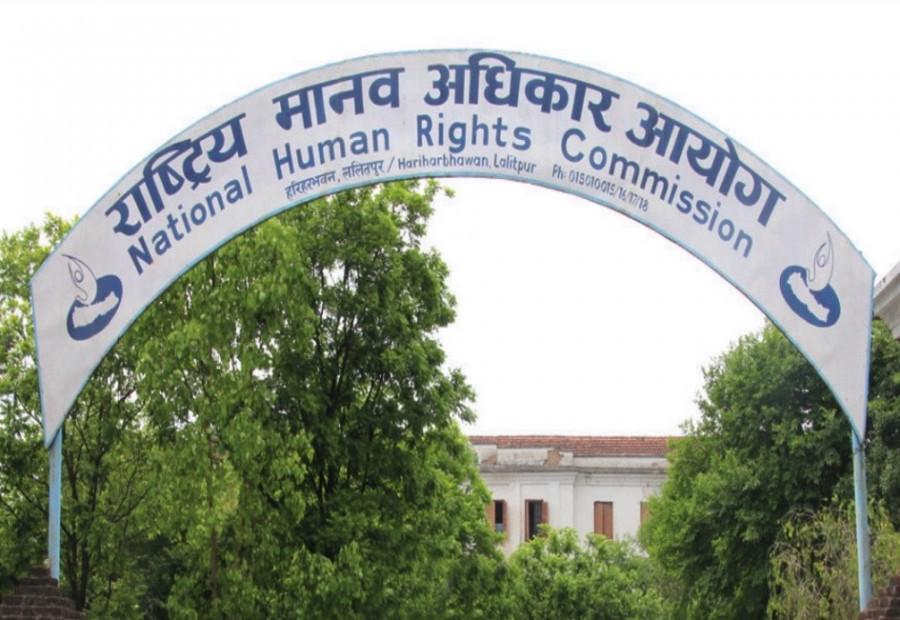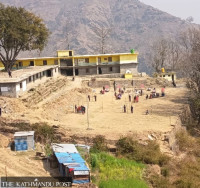National
Government promotes police officer involved in extrajudicial killings
Sub-inspector Dipendra Chand is promoted despite the national rights body recommending action against him.
Binod Ghimire
The National Human Rights Commission on October 16 last year recommended action against five police officials after its probe found their involvement in an extrajudicial killing.
An expert team formed by the commission, after around two years of investigation, had found that a police team led by Deputy Superintendent Rugam Bahadur Kunwar arrested Gopal Tamang, 23, and Ajay Tamang, 24, from Nuwakot for their alleged involvement in an abduction case and shot them dead at Doleshwor jungle in Suryabinayak, Bhaktapur on August 6, 2018.
The team had claimed that the two men were killed in retaliation when they tried to attack the security personnel who were searching for Nishan Khadka—the 11-year-old boy who was abducted from Kandaghari.
The commission had asked the government to book Kunwar along with Sub-inspectors Dipendra Chanda, Prashnna Malla and Ranjit Tamang and Assistant Sub-inspector Rajan Khadka, as the investigation proved that they had killed the alleged abductors after arrest and attempted to cover up the incident.
A team led by Tahir Ali Ansari, a former justice at the Supreme Court, consisting of Bigyan Raj Sharma, a former additional inspector general of Nepal Police and Dr Harihari Osti, a forensic expert, had conducted a detailed investigation into the case.
The commission’s recommendation was left unaddressed by the government. Instead, seven months later on Thursday, the government promoted one of its officials who was supposed to face criminal charges. Chand along with 98 others got promotion to inspectors. His ranking stands at 62.
“It is unfortunate that the government has promoted a person who should be behind bars. This is nothing but an example of how impunity is being promoted in the country,” Bed Bhattarai, a former secretary at the commission, told the Post. “This proves that successive governments are trying to prove the national rights commission irrelevant.”
The Nepal Police says Chand was promoted as he has fulfilled the criteria.
“Only those who meet the set criteria get promotion,” Senior Superintendent Basant Bahadur Kunwar, the Nepal Police spokesperson, told the Post.
“The promotion and the commission’s recommendation are two different things. I believe the commission’s recommendation is being studied.” Kunwar said. “Nepal Police carries out its internal probe even if the commission makes the recommendation.”
The commission has the judicial mandate to investigate and recommend action in cases of human rights violations. It can recommend and even direct the government to take actions in the cases it has investigated.
However, successive governments have paid little attention to implementing its recommendations. Over the years, hundreds of people who were found guilty by the commission’s investigation have gone unpunished. In several cases they have been rewarded by the governments through promotions and other positions.
In order to build pressure on the government to act, the commission on October 15, 2020 published a list of 286 people including former top government and security officials implicated in serious human rights violations ever since the formation of the commission in 2000.
The list includes former Chief of Army Staff Pyar Jung Thapa, former home secretary Narayan Gopal Malego and former chief of Nepal Police Kuber Singh Rana.
“Chand’s case is not the first. Several others have got promotions in the past despite the commission having recommended action against them,” Mohna Ansari, a former member at the commission, told the Post. “However, this proves that no government is serious about protecting human rights and respecting the dignity of the commission.”
Among the total human rights violators implicated by the commission since its formation in 2000, the highest number—98—is from the Nepal Police, followed by 85 from the Nepal Army and 65 from the then CPN (Maoist). The commission has also implicated 16 civil servants, eight Armed Police Force personnel and four teachers. However, no government cared to act as per the commission’s recommendations and directives.
Ansari said the government’s reluctance in taking actions in severe human rights violations has led to an increase in cases of extrajudicial killings and torture at the hands of police and custodial deaths.
“The police seldom investigate the cases where their own officials are involved,” she said. “It is the commission that has to take up such cases but its recommendations aren’t implemented. This is going to challenge the rule of law.”
Ansari says the commission must take Chand’s promotion seriously and draw the government’s attention. Following its reluctance to follow the commission’s recommendations, the Supreme Court in March, 2013 directed the government to implement the recommendations unconditionally.
The bench led by Justice Kalyan Shrestha had said the government must implement the commission's recommendations without ‘ifs’ and ‘buts’.




 27.41°C Kathmandu
27.41°C Kathmandu














